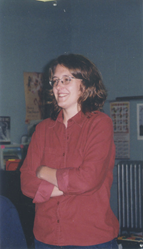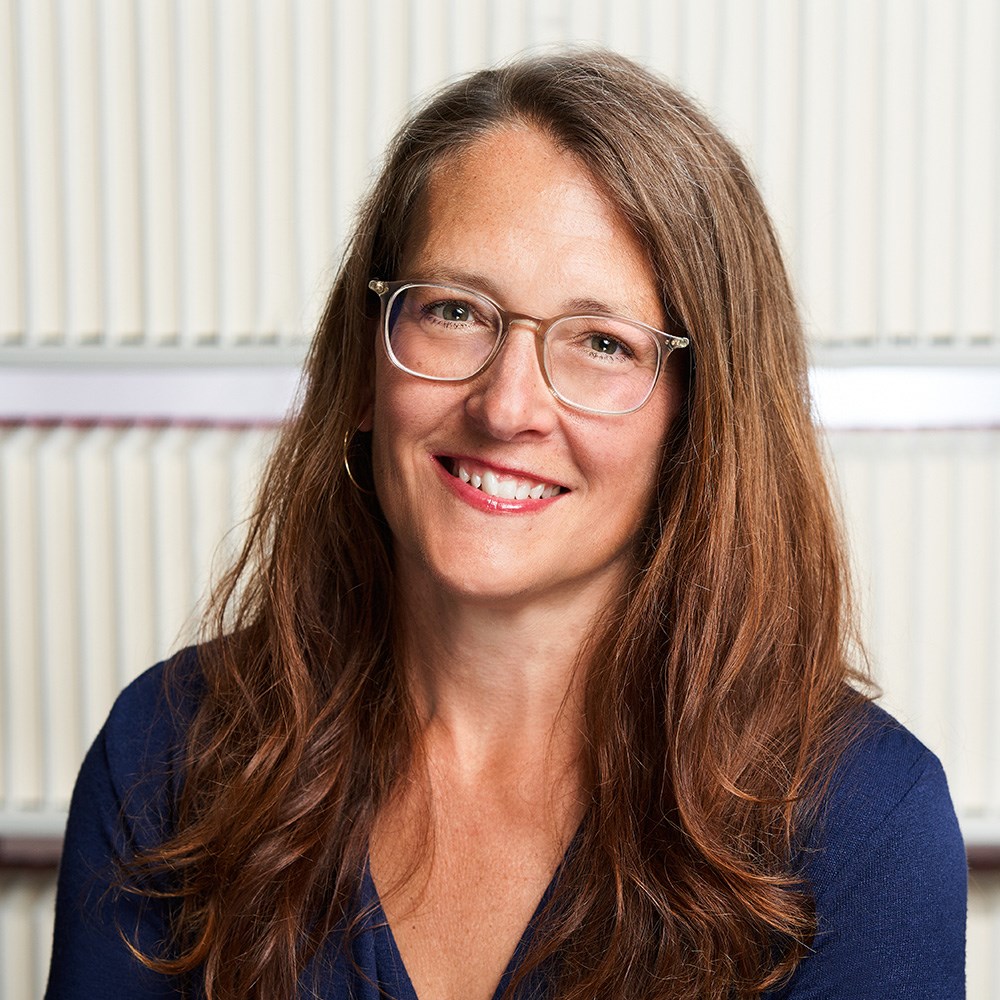Back to Books
May 06, 2021
Our Managing Director, Sally Haldorson, is beginning a new series to share her thoughts on books, business, and the world.
In 1998, I had just completed my Master’s in Creative Writing, and it was my husband’s turn to return to school to get his teaching certificate. That meant it was my turn to help support our household monetarily. I needed a job, but one that would allow me time to write, or at the very least, keep me inspired to write. Since I had previously worked at a mall bookstore after graduating from college, applying for the open Customer Service position at Schwartz Business Books seemed not only a good fit, but a job interview I thought I could ace. Luckily the General Manager at that time agreed, and I began working for the company I have now worked at for 23 years. During that job interview, I probably told some version of this story:
 I grew up with a book in my hand. My mother had been a 1st grade teacher and we had so many books in our house that my father had custom bookshelves put in our basement to house them. We weren’t the type of family to have custom anything, so that’s saying something. My brother and I learned to read early, and I have clear memories of using my mother’s old classroom books to teach school to imaginary students. When my mother died when I was 12, I retreated into books, books a young girl my age probably shouldn’t have been reading—500-page historical romances in the main, less for the romance and more for the time travel—with some Judy Blume thrown in. The Reader’s Digest Condensed Books that my mother had collected were a regular go-to, the stories (I think of these books as analog version of sites like Longreads) more for adults than children. My father would drop me off at the used bookstore in town while he ran errands, and I would spend the afternoon in the shelves, often climbing into my dad’s car with both a well-worn classic, Anna Karenina and Valley of the Dolls come to mind, but also often Harlequin romances or Stephen King. I wasn’t picky; I just had an obsession.
I grew up with a book in my hand. My mother had been a 1st grade teacher and we had so many books in our house that my father had custom bookshelves put in our basement to house them. We weren’t the type of family to have custom anything, so that’s saying something. My brother and I learned to read early, and I have clear memories of using my mother’s old classroom books to teach school to imaginary students. When my mother died when I was 12, I retreated into books, books a young girl my age probably shouldn’t have been reading—500-page historical romances in the main, less for the romance and more for the time travel—with some Judy Blume thrown in. The Reader’s Digest Condensed Books that my mother had collected were a regular go-to, the stories (I think of these books as analog version of sites like Longreads) more for adults than children. My father would drop me off at the used bookstore in town while he ran errands, and I would spend the afternoon in the shelves, often climbing into my dad’s car with both a well-worn classic, Anna Karenina and Valley of the Dolls come to mind, but also often Harlequin romances or Stephen King. I wasn’t picky; I just had an obsession.
There never seemed to be enough books on my shelves or in the stores to fill my hunger, but now I wonder if it wasn’t the limitless nature of books that drew me to them. I could binge on books ad infinitum and that lent a certain kind of limitlessness to my own world as well. My best friend’s uncle was an antique dealer, and she and I would ride along to flea markets. There was often a vendor selling books by the flat for just a few dollars. Our greatest pleasure was to hide away in her family’s pop-up camper parked in her driveway and begin to choose from our loot. One by one we would pull a book off the pile, read the back and the first page aloud to one another, and then one of us would claim it. By the time we were done, we both had stacks of 30 or so books next to us on our bunk, and we would dive in, escaping to a ranch in Montana, or a townhouse in London’s Belgravia. I likely read a book a day back then, during those long pre-technology summers, traveling the world in my friend’s stationary camper.
It only made sense that I would study English literature in college. There I got the formal background that I had lacked from my small-town education and afternoons at the bookstore. I took reading-intensive courses like the one-month class held during the heart of a Minnesota winter where we read four of Dickens’ heftiest novels. I took tutorials with writing instructors who customized a syllabus for each student based on their writing strengths. During that semester I was introduced to writers like Jayne Anne Phillips and Grace Paley and Lorrie Moore and Joan Didion, each writer whose sentences were like music in my ears. During my studies, I swooned over 16th century British male authors who pined and philosophized, I was introduced to 19th century American women writers, like Sarah Orne Jewett and Kate Chopin and Charlotte Perkins Gilman, who would be the first in their field to demand a voice, to take their space in the patriarchy of the canon, and I fell in love with such 20th century novels by Henry James, Willa Cather, Edith Wharton, Mary McCarthy, E.M. Forster.

At my Master’s thesis defense, one of my professors wore a “Would you like fries with that?” novelty t-shirt, implying that I and my fellow writing degree graduates would soon be underemployed. Many years later, I am one of the lucky ones, a romantic who has had the privilege of practically working with books my entire adult life. Working at Schwartz Business Books, which soon became 800-CEO-READ, introduced me to an unfamiliar genre. And I think my expansive love of all types of books led me to grow fond of the “business book,” defending it as not only informative reading, but pleasure reading. Books by Malcolm Gladwell, and Seth Godin, and Ben Horowitz, and Nassim Nicholas Taleb bring psychology and history and philosophy into the genre; books by Brené Brown and Adam Grant and Caroline Criado Perez bring sociology and behavioral science and women’s studies in as well. Industry narratives like Where the Suckers Moon and The Smartest Guys in the Room and Janesville all capture the imagination and teach us more about business than we can learn from a textbook. And books like Essentialism and Quiet and 10% Happier and Flow teach us about ourselves, ground us, while the world around us grows noisier and busier.
 I’ve spent the last 23 years gathering knowledge about our industry and gaining expertise in our company from books. As I moved from Customer Service to Marketing to Management, I gathered knowledge as I read. There are plenty of business book gurus who eschew a formal pursuit of an MBA in favor of a self-led education via reading. Having assisted Jack Covert and Todd Sattersten in writing The Best Business Books of All Time, I’ve spent a fair amount of time with the best of the best in the genre. Much like I collected favorite writers as a kid perusing a used bookstore, or a college student introduced to whole centuries of authors who would go on to change the world through their words, I have my business favorites too. My influences range from current leadership thinkers such as Bill Taylor and Simon Sinek and Rita McGrath, and I’ve put into practice ideas from classics like Servant Leadership, The Goal, Leadership Moment, The Experience Economy, and Blue Ocean Strategy. Simply (and embarrassingly poetically) said, being a reader has made me a better leader.
I’ve spent the last 23 years gathering knowledge about our industry and gaining expertise in our company from books. As I moved from Customer Service to Marketing to Management, I gathered knowledge as I read. There are plenty of business book gurus who eschew a formal pursuit of an MBA in favor of a self-led education via reading. Having assisted Jack Covert and Todd Sattersten in writing The Best Business Books of All Time, I’ve spent a fair amount of time with the best of the best in the genre. Much like I collected favorite writers as a kid perusing a used bookstore, or a college student introduced to whole centuries of authors who would go on to change the world through their words, I have my business favorites too. My influences range from current leadership thinkers such as Bill Taylor and Simon Sinek and Rita McGrath, and I’ve put into practice ideas from classics like Servant Leadership, The Goal, Leadership Moment, The Experience Economy, and Blue Ocean Strategy. Simply (and embarrassingly poetically) said, being a reader has made me a better leader.
But now? Sometimes I go months without reading a book. Me! Yes, I still read for pleasure at home, though not as much as I once did, and I read Harvard Business Review and Inc. articles on timely topics, but I don’t spend as much time with our “product” as I once did. And I find I miss not only the exercise of reading, but the gathering of new knowledge that can only be found between the pages of a book. And that is what this new column on our blog is about: resetting the habit of reading, so that I can bring that knowledge to bear in the company where I have spent my career. Here I will talk about books, but also the lessons learned. And I might tell a story or two. So, readers, fellow lovers of books, let’s get back to the basics. Let’s get Back to Books.


